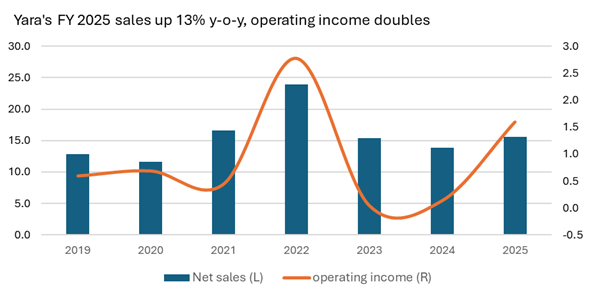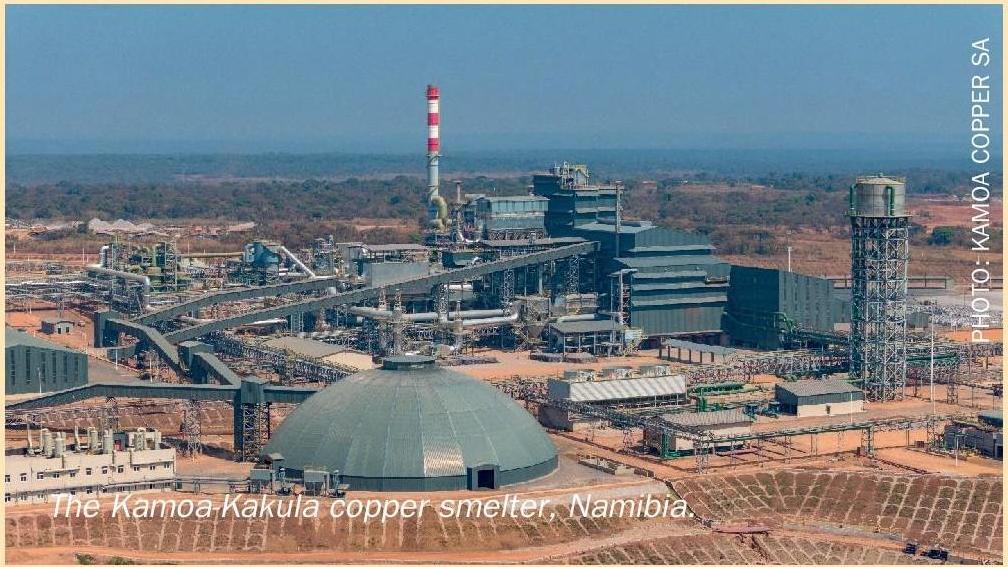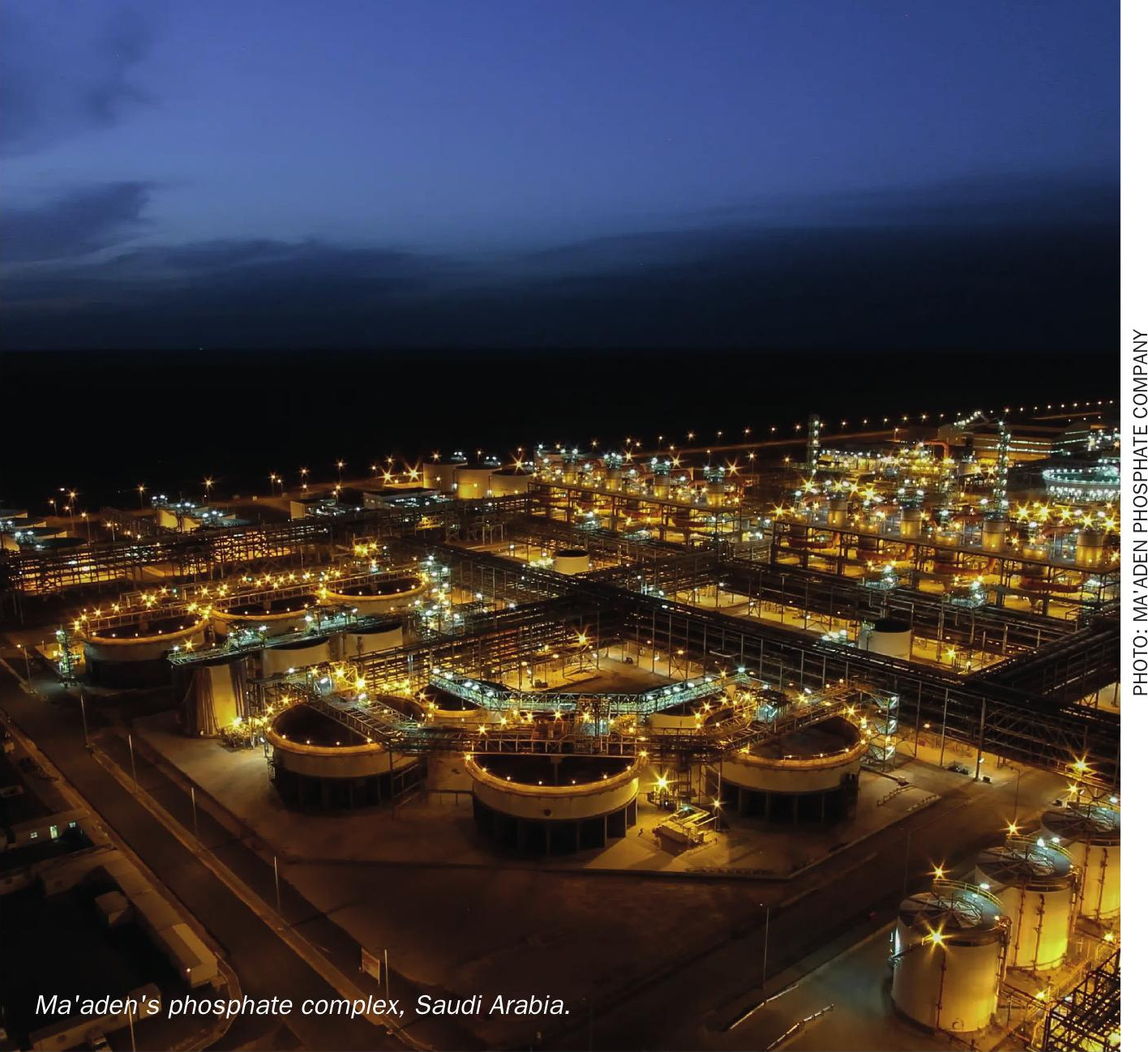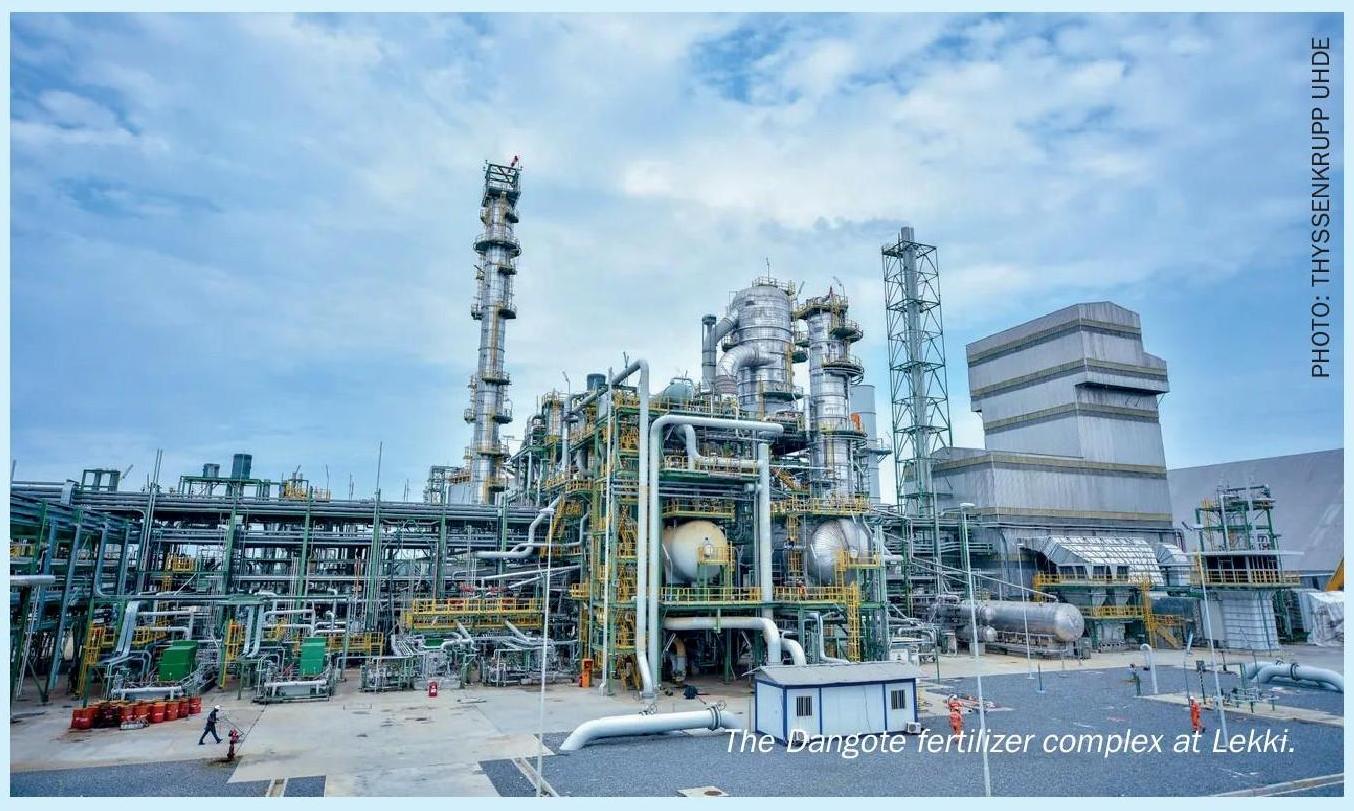Fertilizer International 518 Jan-Feb 2024

31 January 2024
Fertilizer Industry News Roundup
Fertilizer Industry News
SAUDI ARABIA
Ma’aden and partners develop unique phosphogypsum recycling process
The Saudi Arabian Mining Company (Ma’aden) has entered into a partnership with Metso and thyssenkrupp Uhde to develop and license an integrated process to reduce carbon emissions and recycle phosphogypsum in Saudi Arabia. A framework agreement between the three partners was jointly announced on 10th January.
The innovative new process, which will form the centrepiece of a new complex in Ras Al Khair, is designed to reduce CO2 emissions across Ma’aden’s phosphate business. Ma’aden has already been granted a US patent for this integrated CO2 and phosphogypsum recycling technology.
The partners plan to incorporate the patented technology at the greenfield Ras Al Khair complex. It will capture CO2 with lime generated from the calcination of phosphogypsum using sulphur. The new process is designed to reduce CO2 emissions across Ma’aden’s phosphate business, making it more sustainable in the long-term. It will also recycle phosphogypsum waste and transform this into a useful resource.
Ma’aden says the patented approach is dual-purpose and addresses two of the phosphate industry’s most pressing environmental challenges – first, the decarbonisation of production to prevent atmospheric CO2 pollution and, second, the effective reuse of phosphogypsum, a by-product of phosphate production that is generated in very large quantities. Overall, the new process offers global warming mitigation via sustainable carbon capture as well as providing a viable solution for phosphogypsum recycling.
Hasan Ali, executive vice president, Ma’aden Phosphate, said, “This pioneering patent, combined with our new CO2 capturing complex, underscores Ma’aden’s commitment to sustainability. We look forward to working with Metso and thyssenkrupp Uhde to develop this important project that will truly change and reduce the carbon footprint of our phosphate business. It puts us at the forefront of innovation, turning what was once leftover material into a valuable resource, while significantly reducing CO2 emissions. It’s a giant leap towards a sustainable future.”
Hannes Storch, vice president for metals and chemicals processing at Metso, added: “We are excited to see this unique project moving forward. The new concept for phosphogypsum processing will be a major step forward in the fertilizer industry, contributing to sustainability targets, such as waste recovery and limiting global warming. Metso contributes to the project with our extensive know-how and experience in the field of fluid bed, gas cleaning and sulfuric acid solutions.”
“We are honored to be chosen from our esteemed customer to provide our technology and expertise,” said Lucretia Löscher, COO thyssenkrupp Uhde. “We are providing the innovative process to turn the phosphate industry into a circular economy. This project will be another important milestone for thyssenkrupp Uhde in enabling the green transformation for our customers.”
Ma’aden is the Middle East’s largest commodity mining and metals company and one of the fastest-growing mining companies in the world, generating revenues of $10.7 billion in 2022. The Saudi mining giant operates 17 mine and production sites in the Kingdom, has more than 6,500 direct employees, and exports products to over 30 countries.
The company has huge growth plans for phosphate, aluminium, gold and copper mining over the next 18 years, and to extract new minerals – enabling Ma’aden to capture a greater share of Saudi Arabia’s $1.3 trillion endowment in mineral resources and turn these into commercial opportunities.
Ma’aden also wants to be a role model in responsible and sustainable mining as set out in the government’s Vision 2030 strategy for the Saudi economy.

UNITED KINGDOM
Anglo seeks outside investors for Woodsmith mine
Mining giant Anglo American is looking to sell a minority stake of up to 49 percent in its Woodsmith polyhalite fertiliser mine project in the UK, The Times reported on 27th December.
The company’s chief executive Duncan Wanblad told city analysts that the company is “moving at pace to find a partner” to share project costs. Anglo has already begun to identify potential investors before starting a formal sales process, The Times said, having itself already injected $2.5bn into the project to date.
There is speculation that the company will target infrastructure investors and sovereign wealth funds as well as looking for further binding offtake agreements for it POLY4 product from the fertilizer industry.
Wanblad said Anglo needed “the right partner at the right price for this particular asset”. It is understood that the company is looking to secure new investors for the project by early 2025, with an external stake of up to 49 percent on offer, allowing Anglo to maintain project control.
Project costs have risen rapidly since the project’s inception. This is partly because Anglo has needed to redesign, over several years, what was originally a junior mining project. The Times reported on 9th November that project costs had tripled since 2017, describing the Woodsmith mine as a “money pit” for Anglo.
In 2017, Sirius Minerals, the project’s previous owner, originally estimated that the Woodsmith mine would cost $2.9 billion to build. But Tom McCulley, the head of Anglo American Crop Nutrients, has now confirmed that recent estimates by analysts that the Woodsmith mine could cost around $9 billion to complete were not “too far off”.
The 13 million t/a capacity project to construct Europe’s deepest mine near Whitby in North Yorkshire is scheduled to enter production in 2027. Anglo announced a series of upgrades to the Woodsmith mine’s core infrastructure last year as part of strategy update. These are designed to deliver a larger and more scalable polyhalite mining operation (Fertilizer International 514, p44).
UNITED ARAB EMIRATES
ADNOC to buy out OCI’s stake in Fertiglobe
The Abu Dhabi National Oil Company (ADNOC) has entered into a binding agreement with OCI Global to acquire its entire majority shareholding in Fertiglobe for $3.62 billion.
The agreement to purchase OCI’s ‘50 percent plus one share’ holding – announced on 15th December last year – will make ADNOC the majority shareholder in Fertiglobe, increasing its total shareholding to 86.2 percent. The transaction is expected to complete this year.
The agreement also incorporates an earn-out mechanism for the next two years, this being linked to commodity pricing and the free cash flow performance of Fertiglobe’s business over this period.
Fertiglobe is the world’s largest seaborne exporter of urea and ammonia. It is also the largest nitrogen fertilizer producer in the Middle East and North Africa, with production facilities in Egypt, Algeria and the UAE. The transaction supports ADNOC’s chemicals strategy and its plans to establish a global growth platform for ammonia – a key low carbon fuel and hydrogen carrier that is expected to play an important role in the energy transition.
Khaled Salmeen, executive director, downstream, marketing and trading directorate at ADNOC, said: “Working in close partnership with OCI since 2018, we have successfully listed and grown Fertiglobe into the world’s largest seaborne exporter of ammonia and urea fertilizers. Today’s agreement reinforces ADNOC’s long-term commitment to Fertiglobe and our continued focus on delivering growth and maximising value for the company’s shareholders. This important transaction supports ADNOC’s ambitious chemicals growth strategy and accelerates our plan to establish a global growth platform for ammonia and clean ammonia.”
UNITED STATES
OCI sells Iowa Fertilizer Company to Koch
OCI Global has agreed to sell its wholly-owned US subsidiary Iowa Fertilizer Company (IFCO) to Koch Ag & Energy Solutions for $3.6 billion. The binding agreement was announced on 18th December last year.
IFCO is located in Wever, Iowa, and produced 1.2 million t/a of urea ammonium nitrate (UAN), 700,000 t/a of anhydrous ammonia and 700,000 t/a of diesel exhaust fluid (DEF) in 2021.
The announced sale of IFCO to Koch follows a strategic review by OCI in March 2023. OCI is expected to use the proceeds from the transaction to pursue value-added opportunities in the energy transition. The company has been an early mover into lower-carbon ammonia and green methanol production and is seeking to build on this.
Nassef Sawiris, the executive chairman of OCI, said: “Today’s announcement marks an evolutionary step in our journey to create value for shareholders, and to enhance our focus on efforts in lower carbon initiatives. IFCO was the first worldscale greenfield nitrogen fertilizer facility built in the United States in over 25 years. We are confident that under Koch’s stewardship, IFCO will be well positioned for its next phase of growth. Our strengthened balance sheet will support the acceleration of our strategy in the field of decarbonisation projects, driving future growth and supporting the energy transition goals we share with many of our stakeholders, establishing us as a leader in the low carbon space.”
The transaction is expected to close in 2024 but remains subject to US antitrust approval and other customary closing conditions.
EGYPT
Agreement to develop green hydrogen project
ACWA Power has signed a framework agreement to develop the first phase of a green hydrogen/ammonia project in Egypt.
The agreement was signed on 7th December with the Sovereign Fund of Egypt, the Suez Canal Economic Zone, the Egyptian Electricity Transmission Company, and the New and Renewable Energy Authority in the presence of Dr Moustafa Madbouly, Egypt’s prime minister.
The first phase of the $4 billion project has a green ammonia production capacity of 600,000 t/a, with the potential to scale up to two million t/a of capacity in the project’s second phase. The hydrogen feedstock for the project will be generated electrolytically from wind and solar plants.
Saudi-listed ACWA Power, the world’s largest private water desalination company, has been rapidly expanding its green portfolio. The company is currently developing the NEOM Green Hydrogen Project, the world’s first utility-scale green hydrogen plant, in the northwest of Saudi Arabia, as part of a joint venture with Air Products and NEOM. The project will have the capacity to produce 1.2 million t/a of green ammonia.
The company also broke ground on its second green hydrogen project in Uzbekistan on 27th November. The first phase of this project will produce 3,000 t/a of green hydrogen, with a second phase expansion to 500,000 t/a of green ammonia also planned. This will be powered by 2.4 GW of wind energy.
Marco Arcelli, the CEO of ACWA Power, said: “As a first mover in green hydrogen, ACWA Power is proud to bring its expertise in this new and exciting market to Egypt. We commend our partners for their bold step into producing the fuel for the future, for which there will be great demand in Europe and the rest of the world. Egypt is well-positioned to become one of the world’s top producers of green hydrogen and we are elated to be a part of the country’s energy transition.”
ACWA signed new agreements for green hydrogen projects in Jordan and Indonesia during the recent COP28 conference.
AUSTRALIA
Uhde to license Karratha project granulation unit
thyssenkrupp Fertilizer Technology has signed a contract with Saipem to license a urea granulation unit for the Karratha project in Western Australia.
The Karratha project is being constructed by a 50:50 joint venture (50/50) between Saipem and Australian company Clough on behalf of its developer Perdaman Chemicals and Fertilisers. The project reached financial close in April last year.
The 6,200 t/d capacity urea granulation unit at Karratha – made up of two identical trains of 3,100 t/d – will use thyssenkrupp’s proprietary UFT® fluid bed urea granulation process. This technology is responsible for more than 70 percent of the urea granules produced worldwide. thyssenkrupp Fertilizer Technology will be responsible for the licensing and process design package for the granulation plant and supplying the main equipment. This incudes the supply of two granulators and two exhaust air scrubbers.
Dr Cord Landsmann, thyssenkrupp Uhde’s CEO, said: “This project for Perdaman marks an important milestone that will further consolidate our position as a technology supplier in the fertilizer industry. We are proud to have been selected as the partner to supply our highly efficient urea granulation technology. With our proven UFT® fluid-bed urea granulation technology, we guarantee the production of a consistent top-quality product and, at the same time, strict compliance with environmental standards. We are pleased to be supplying the market with advanced technologies for fertilizer production and furnishing our global customers with the best solutions.”
Perdaman’s chairman, Vikas Rambal, added: “We are pleased to be building Australia’s biggest downstream project, which represents a major investment in the Australian production sector. This state-of-the-art plant will contribute to Australia having a safe and reliable source of high-quality urea, thus supporting the farmers and food producers. The decision in favour of thyssenkrupp Fertilizer Technology as the technology supplier and licensor for this urea project not only speaks for the competence of thyssenkrupp Fertilizer Technology, but also for confidence in the ability of the company to supply reliable solutions for the fertilizer industry.”


EUROPE
Europe’s fertilizer industry commits to decarbonisation
Trade body Fertilizers Europe has unveiled a decarbonisation roadmap for the European fertilizer industry.
The document, published on 14th November last year, commits Europe’s nitrogen producers to climate-neutral production of ammonia by 2050. It also sets out steps required to achieve two intermediate targets by 2030:
1. Reduce ammonia production greenhouse gas (GHG) emissions by 31 percent (trajectory 1)
2. Produce 50 percent of ammonia production via water-electrolysis (trajectory 2).
“With the appropriate legislative framework, investment landscape, and collaborative efforts we will ensure Europe’s food security and strategic autonomy for generations to come,” Fertilizers Europe said in a statement.
“Our European fertilizer industry supports the EU Green Deal and is committed to play its part in Europe’s climate objectives. By 2050, at the latest, every kilogram of fertilizer produced in Europe could be climate neutral. The real challenge is how to successfully transition to low-carbon production while remaining globally competitive,” said Antoine Hoxha, Director General of Fertilizers Europe.
The Roadmap, developed with consultancy Guidehouse, explores two main pathways on how Europe’s fertilizer industry can decarbonise, as Antoine Hoxha explains:
“From 2005 to 2020, our sector has already reduced its scope 1 and 2 emissions by 49 percent, placing European fertilizer industry as best in class globally. Going beyond this level of ambition, a drastic change in the production process is required. Such massive change can only materialise with the deployment of a technology-neutral approach, substantial and targeted support and access to affordable, low-carbon and renewable energy”.
The roadmap includes cost estimates for this transition. If all the hydrogen used in lowcarbon ammonia production was produced with offshore wind-driven electrolysers, for example, this would require investments of:
- e64 billion only for the wind parks
- e17 billion for the electrolysers
- e3 billion for a hydrogen pipeline network.
“Decarbonising domestic production is of strategic importance for Europe to ensure its long-term food security and autonomy. We are looking forward to working with the European Commission, the European Parliament, Member States governments and wider stakeholders to ensure that we all contribute in a timely manner to drive this change forward,” concluded Antoine Hoxha.





